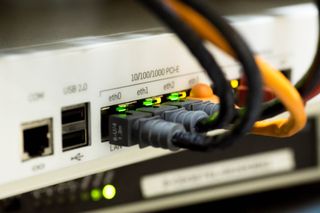An ISP is now throttling speeds in whole neighborhoods to deal with 'excessive usage'
This practice raises the question of whether net neutrality rules would have resulted in a different approach.

Internet service providers are having their network capacities put to the test as more people take to telecommuting (or are simply stuck at home) during the current pandemic. This has resulted in some throttling, and not just by video streaming services like Netflix. Cox Communications, the third largest cable provider in the US, is crimping upload speeds in some neighborhoods where overall usage is high.
That may not seem unusual on the surface, but what makes it a bit more controversial is that Cox is seemingly punishing lighter usage customers who happen to live near customers who have been flagged for "excessive usage."
Cox confirmed this to Arstechnica, saying heavy data users "are causing congestion problems in a small number of neighborhoods by utilizing over 100-200 times more upstream bandwidth than the average household." In those neighborhoods, everyone pays the price in the form of throttled uploads.
Arstechnica reached out to Cox after hearing from a subscriber in Florida named Mike, who pays $150 a month for service. That includes $100 for 1Gbps download speeds and 35Mbps upload speeds with a 1TB cap, plus $50 for unlimited data plan that is not really unlimited (but does allow him to exceed 1TB/month).
Mike drew multiple warnings from Cox for his heavy data usage, which he explained exceeds 8TB per month mostly due to backups he schedules to run from 1am to 8am. One of the emails Mike received from Cox informed him that not only would his upload speeds be throttled, but so would the speeds of other Cox subscribers in his neighborhood.
"During these unprecedented times, many people are working and schooling from home, and maintaining connectivity is important. We are working to provide a positive Internet experience for everyone, so we've adjusted our Gigablast upload speeds in your neighborhood from 35Mbps to 10Mbps, now through July 15, 2020. Your download speeds have not changed," Cox said. The ISP didn't explain how a 25 mbps change in upload speed, for a user primarily active from 1 am - 8 am, would make a substantial impact on its network.
In essence, Cox is punishing whole neighborhoods for the usage habits of a few, or even just a single person. From Cox's vantage point, 10Mbps is still "plenty of speed for the vast majority of customers." However, the ISP did not explain why it is going this route instead of throttling just the subscribers who exceed whatever the "unlimited" data cap is set at.
The biggest gaming news, reviews and hardware deals
Keep up to date with the most important stories and the best deals, as picked by the PC Gamer team.
This raises the question: Would Cox be able to do this if net neutrality regulations had not been repealed? There is no clear cut answer.
A senior executive of Public Knowledge, a non-profit public interest group, tweeted in response to the article that Cox's neighborhood-wide throttling "would probably have violated the disclosure rules under the 2015 net neutrality order," but it's not a given. Even with net neutrality rules in place, ISPs had some leeway for "reasonable network management" as needed to "reduce or mitigate the effects of congestion on its network."
Paul has been playing PC games and raking his knuckles on computer hardware since the Commodore 64. He does not have any tattoos, but thinks it would be cool to get one that reads LOAD"*",8,1. In his off time, he rides motorcycles and wrestles alligators (only one of those is true).
Most Popular






